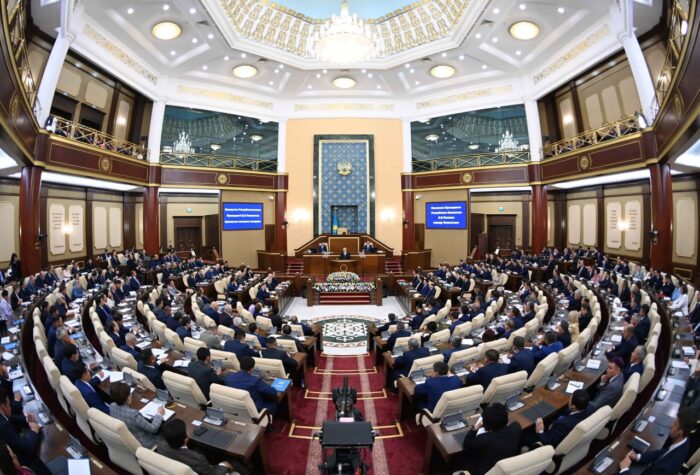ASTANA – Kazakhstan should resolutely transition to a new economic model, prioritizing tangible improvements in citizens’ lives, said President Kassym-Jomart Tokayev in his annual state-of-the-nation address on Sept. 1, reported the Akorda press service.

President Tokayev during the Sept. 1 state-of-the-nation address. Photo credit: Akorda.
“The new economic course of the country will be guided by principles of fairness, inclusiveness and pragmatism,” stated Tokayev.
The 90-minute address took place with the participation of deputies (members) of the Mazhilis (lower house of Parliament) and the Senate (upper house), as well as heads of central government agencies, members of the National Kurultai (Congress), the Human Rights Commission, the National Commission for Women’s Affairs, Family and Demographic Policy, and representatives from the public and labor communities.
The President highlighted the country’s large-scale political reforms since 2022, and its extensive efforts to safeguard human rights and uphold the rule of law.
“However, to become a truly developed country, Kazakhstan should combine political reforms with deep and comprehensive social and economic transformations. Despite challenging geopolitical circumstances, Kazakhstan maintains positive trends in all key economic indicators,” Tokayev noted.
Last year, Kazakhstan’s gross domestic product (GDP) reached 104 trillion tenge ($226.2 billion). The country also attracted a record $28 billion in foreign direct investment, and its foreign trade turnover reached $136 billion with $84 billion in exports. The nation’s external reserves are approaching $100 billion.
Focusing on the main pillars of the upcoming structural economic reforms, Tokayev stressed that forming a robust industrial foundation and achieving economic self-sufficiency were paramount. He advocated for accelerated development of the manufacturing sector through transformative national projects.
“The need for economic diversification is becoming increasingly urgent. Our focus should be on areas such as deep processing of metals, oil, gas, coal chemistry, heavy engineering, uranium conversion and enrichment, automotive components, and fertilizers. Essentially, the country needs to establish high-value-added clusters,” he said.
The President also emphasized the importance of boosting Kazakhstan’s tourism potential. He proposed implementing at least 15 significant projects in collaboration with foreign and domestic investors.
Another priority, he noted, is to strengthen the defense industry, which is vital for national security. Kazakhstan should establish a production cycle that focuses on localisation in order to decrease its reliance on imports.
Tokayev instructed the government to modernize the national army with high-tech weapons and military equipment, including armored vehicles, drones, and modern firearms.
He also encouraged supporting local businesses through budget financing and simplified procurement processes.
Addressing issues such as the extractive industry, environmental degradation, and recent increases in worker casualties, the President emphasized the need for decisive measures to improve technological and environmental conditions as well as health protection systems at enterprises. Major industrial firms must undergo technological and environmental audits every five years.”
The President noted the necessity to reform geological exploration and the mining sector management system, emphasizing the lack of significant geological discoveries in a resource-rich country like Kazakhstan. Private investments could help to develop the industry’s potential, he pointed out.
“The right to use the subsoil should be granted to investors undertaking geological exploration at their own expense. We should enhance the approval process by introducing comprehensive state expertise and full digitalization,” he explained.
He also instructed the government to expand geological and geophysical exploration areas from the current 1.5 million square kilometers to at least 2.2 million by 2026, prioritizing the development of rare and rare earth metal deposits.
“By year’s end, the country should establish a comprehensive vision for the industry’s development. To support the manufacturing industry, foreign and domestic investors should be exempted from paying taxes and other obligatory payments for the first three years. This should give a significant impetus to the manufacturing industry,” Tokayev said.
Tokayev concluded by stating that the government will bear sole responsibility for economic policy implementation, warning against delays and bureaucratic obtsacles that may arise. He relieved the government of the need to coordinate its actions with the Presidential Administration.

